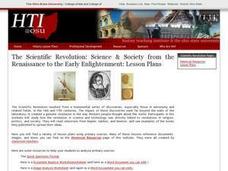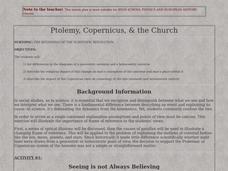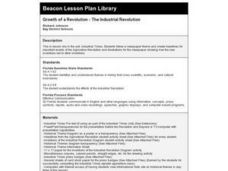Crash Course
The Scientific Revolution: Crash Course History of Science #12
The Scientific Revolution forever changed our concept of astronomy! Science scholars explore the major mindshift in Europe that signaled the beginning of a new area during the 12th installment of a 15-part series discussing the History...
Macat
An Introduction to Thomas Kuhn's The Structure of Scientific Revolutions
Discover the nature of scientific understanding with a short synopsis of Thomas Kuhn's The Structure of Scientific Revolutions. An animated video guides viewers through Kuhn's theories on the periods of extraordinary science and the...
Curated OER
The Price to Be Paid For the Next Scientific Revolution
Seventh graders work as advisors to the President evaluating issues like cloning, cryogenics, assisted suicide, etc. They research the Scientific Revolution of the past and the outcome and then put together a plan for the President.
Curated OER
The Scientific Revolution in England and Europe
Students read and discuss Scientific Revolution information sheet and the diagram concerning the causes of the Scientific Revolution. They construct a timeline including Aristotle, Democritus, Copernicus, Bacon and Descartes along with a...
Curated OER
Scientific Revolution
In this scientific revolution study guide worksheet, students respond to 14 short answer questions. The questions correlate to assigned readings in a textbook.
Curated OER
Scientific Revolution
In this Scientific Revolution worksheet, students examine 6 pictures and then write the names of noteworthy people each of the pictures represent.
Curated OER
People of the Scientific Revolution
In this Scientific Revolution worksheet, learners read a brief overview of the contributions of Copernicus, Bacon, Kepler, Galileo, Newton, and Harvey.
Benjamin Franklin Tercentenary
Ingenious: Franklin Assembles a Scientific Community
Few Americans have heard of the burgeoning scientific community known as the America Philosophical society, started by none other than Benjamin Franklin. With inquiry, research, and discussion, high schoolers come to understand their...
Crash Course
The Scientific Methods: Crash Course History of Science #14
How do we know what we know? Examine the asker of this, and many other questions, during the 14th installment in a 15-part History of Science video series. The narrator explains the important contributions made by Galileo, Bacon, and...
Curated OER
The Scientific Revolution
Scientists participate in studying how new scientific advances have changed the world. They explain how astronomers have changed the way people view the universe, summarize the advances that were made in chemistry and medicine, and...
Curated OER
The Importance of Revolutions in Our Lives
Sixth graders examine different revolutions that occurred throughout history (Industrial revolution, French revolution, etc.). In this social studies and World history lesson, 6th graders research an assigned revolution on the Internet,...
Crash Course
Newton and Leibniz: Crash Course History of Science #17
The scientific revolution went out with a bang, thanks to some impressive intellectuals! Newton's and Leibniz's noteworthy discoveries unfold in the 17th installment in a lengthy History of Science series. Viewers witness the birth of...
Curated OER
Ptolemy, Copernicus, & the Church
Students explore the scientific revolution. In this scientific revolution lesson, students complete activities regarding Ptolemy, Copernicus, and the Church.
Curated OER
INDUSTRIAL REVOLUTION
Tenth graders identify causes and effects of the Industrial Revolution, analyze the benefits and negative consequences, describe the operation of British government, and identify British social and political reforms resulting from the...
Curated OER
The Scientific Revolution
In this Scientific Revolution study guide worksheet, students read a brief overview pertaining to the topic and then respond to 6 reflection questions.
Curated OER
The Impact of Cultural Values in EArly Industrial England
Tenth graders analyze works from the period of the Industrial Revolution in England and identify the cultural values depicted and inferred that paved the way for the Industrial Revolution to occur at this time. They create captions that...
Physics Girl
Should You Go to Mars? Ft. Bill Nye
Would you move to Mars? A video discussion explores the realities of traveling and living on Mars. Characteristics of the planet, its orbit, and revolutions provide key facts to help you make your decision.
Crash Course
The New Chemistry: Crash Course History of Science #18
Chemistry was a bit of a late bloomer in terms of scientific progress! Discover the Age of Enlightenment and its effects on how researchers viewed matter with an engaging video. The narrator highlights the work of Antoine Lavoisier and...
Curated OER
The Inventions and Effects of the Industrial Revolution
Learners understand that the Industrial Revolution began in England, spreading to the rest of Western Europe and the United States and with it came an increased demand for raw materials from the Americans, Asia, and Africa.
Curated OER
Growth of a Revolution - The Industrial Revolution
Fourth graders study the Agriculture Revolution and create a newspaper entitled Industrial Times. They follow a newspaper theme and create headlines for important events.
TED-Ed
Neil deGrasse Tyson Replies to Lincoln's Gettysburg Address
President Abraham Lincoln may not be the first name that comes up when discussing scientific advancement in the last two centuries, but Dr. Neil deGrasse Tyson believes that Lincoln's efforts during the Civil War paved the way...
Curated OER
The Information Revolution: A Hypothetical Case
Students consider the implications of the information revolution. In this information age lesson, students discuss informatics and the misuse of information. Students form a fictional bureau of information control and hold a simulated...
Benjamin Franklin Tercentenary
Designing Benjamin Franklin: In Search of a Better World
How do you convey someone’s creativity? Individuals answer the question as they design exhibitions to showcase the intellect and genius of Benjamin Franklin. After conducting research, classmates work in groups to try to capture and...
Curated OER
Islamic Scientific Contributions to Civilization
Seventh graders explore several well documented artistic and scientific accomplishments that were discovered or perfected during The Golden Age of Islam. They are staff writers of a magazine who create a feature article about a topic...
Other popular searches
- The Scientific Revolution
- First Scientific Revolution
- Scientific Revolution Video
- Causes Scientific Revolution
- Galileo Scientific Revolution

























